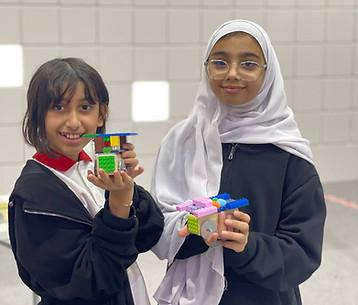Curriculum
Early Years at Al Murooj (FS1 and FS2)
Our early years program, forming the foundation of our curriculum, closely aligns with the principles of the Early Years Foundation Stage. It integrates early learning and care, ensuring a seamless and enriching experience for our young learners. Each classroom is thoughtfully equipped with abundant resources to facilitate comprehensive learning. Specifically tailored to their developmental stage, our kindergarten features ample and age-appropriate play areas, providing the ideal environment for children to explore, discover, and thrive. Our curriculum encompasses the seven pillars of the UK National Curriculum Early Years curriculum: Communication and Language, Physical Development, Personal, Social, and Emotional Development, Literacy, Mathematics, Understanding the World and Expressive Arts and Design

Primary Stage (Year 1 - Year 6):
Our primary stage curriculum embodies foundational learning principles, promoting a comprehensive educational experience. Fostering a holistic approach to education, our curriculum seamlessly integrates various learning domains. Within our primary classrooms, abundant resources are provided to support diverse learning activities. Furthermore, our primary section boasts dedicated facilities tailored to the specific needs and interests of young learners, facilitating an enriching environment conducive to active learning and exploration.
Lower Secondary (Year 7)
Our lower secondary curriculum is crafted to advance from fundamental concepts, fostering rich and diverse learning experiences. Embracing a comprehensive educational approach, our curriculum seamlessly weaves together different subject domains to provide a holistic learning journey for students. Within our lower secondary classrooms, students benefit from an array of resources that bolster varied learning activities and promote exploration. Furthermore, our lower secondary section offers specialized amenities tailored to meet the distinct needs and interests of adolescent learners, cultivating an immersive environment conducive to active learning and personal development.
